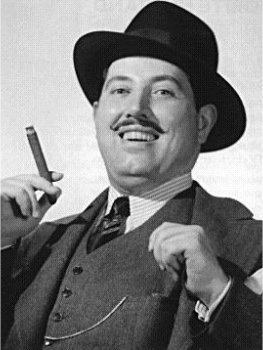The eighth volume of The Great GIldersleeve from Radio Archives collects the twelve circulating episodes between episodes seventy-seven to ninety-one and all starring Harold Peary in the titular role as Tow Water Commissioner Throckmorton P. Gildersleeve. This set takes us through the end of the show’s second season and features two episodes of the third, all from 1943. While there are three lost episodes, it feels like we miss less that impacted ongoing plotlines than in previous box sets. The big exception would be that the mini-feud between Gildersleeve and Judge Hooker (Earle Ross) over a fender appears to have been ironed out in the missing eightieth episode.
I have to praise Radio Archives for the wonderful cover art that they commissioned for this set, with Gildersleeve and Leila Ransom (Shirley Mitchell) as the the focal point of the first ten episodes of the set, which build up to their scheduled nuptials. Related plots deal with planning the wedding and the honeymoon, as well as Gildersleeve’s attempt to work up a budget. I think the second half of the season gives a bit more meat to Leila as a character beyond “Southern Belle who likes to manipulate men,” making her much more sympathetic and well-rounded. In the season finale, just before the show went on summer vacation, the wedding day found Gildersleeve with a serious case of cold feet, leading to a shocking season-ending twist.
There is more than the wedding going on in Summerfield in this set. This box set also sees the introduction of Ben (played by future Dragnet co-Star Ben Alexander) as the bashful young beau of Marjorie (Lurene Tuttle) and he makes a fun addition to the cast. Meanwhile, Leroy (Walter Tetley) goes to work for Mr. Peavey, the druggist (played brilliantly by Richard LeGrand) in the second half of the season. Gildersleeve and a few of his pals also sing together, which is a foretaste of the coming of the Jolly Boys Club in later seasons.
The War features, although in a smaller way, during the second half of season two. When Leroy gets his first paycheck, he buys a lot of knick-knacks for the family and otherwise wastes it on typical kid things. He is reproved for not using some of his money to buy war bonds. Season three’s larger focus on the War would show up in the final episode in the set.
The new focus was due to the donation of the sponsor, Kraft, to the Third War Loan Drive. The town is focused on selling more bonds to meet its quota and sends the head of city departments out canvassing (including Gildersleeve) door-to-door to sell bonds. Yet, in many ways, Gildersleeve’s heart is just not in it. For one thing, he is mad at the chairman of the drive, the local newspaper editor. He tries to start a one-way feud over the editor having published an editorial raising reasonable concerns about the town’s water quality, and drags his feet on getting out to cover his territory. Gildersleeve also expresses frustration with the war, with how it has disrupted the world and changed the general focus and behavior of women. Nearly two years after Pearl Harbor, Gildersleeve is no doubt speaking for many listeners. Yet, the end of the episode brings him, and hopefully other war-weary Americans, back to center.
The episode may be the strongest of the set for showing Gildersleeve’s humanity. And really that’s the strength of the series. Gildersleeve is a funny character, but ultimately quite human with both big flaws (such as as being a loud-mouth and braggart) and positives such as being well-intentioned, responsible, and caring. And after its second season, Summerfield feels far more like a real town where real people live, which makes the comedy far more satisfying.
Overall, this is another strong collection from an old time radio sitcom that was getting even better as it went along.
Rating: 4.5 out of 5.

 Going back to his Chicago radio days, Harold Perry made more than 10,000 radio appearances. However, there’s one role that Perry’s career is associated with Throckmorton Gildersleeve. In 1939,Gilldersleeve was introduced on Fibbery McGee and Molly and became an instant his signature laugh and catchphrases like, “You’re a hard man, McGee!”
Going back to his Chicago radio days, Harold Perry made more than 10,000 radio appearances. However, there’s one role that Perry’s career is associated with Throckmorton Gildersleeve. In 1939,Gilldersleeve was introduced on Fibbery McGee and Molly and became an instant his signature laugh and catchphrases like, “You’re a hard man, McGee!”